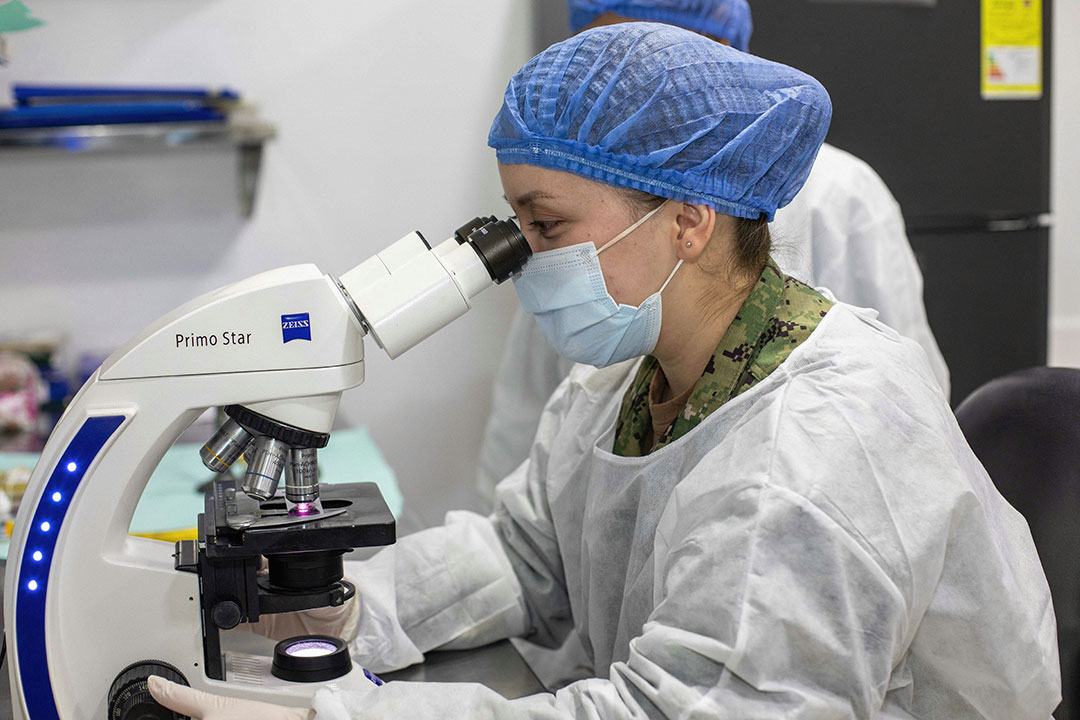How surveillance can detect shape-shifting bacteria to stop them evading vaccines
Pneumococcal conjugate vaccines have saved millions of lives, but some bacterial strains have evolved to evade them. Genetic sequencing could help vaccine-makers stay one step ahead of the pathogen.
- 18 August 2022
- 4 min read
- by Priya Joi

A global genomic surveillance study has pinpointed how some strains of Streptococcus pneumoniae, the deadly bacterium that causes diseases such as pneumonia and meningitis, are able to evade vaccines – and is now providing valuable data to those making the next generation of vaccines.
“One of the most exciting outcomes has been that the work that we started back in 2011 has really matured now and can influence vaccine design, which can have a big impact in reducing infant mortality.”
The study, published on 16 August in Lancet Microbe, was led by the Wellcome Sanger Institute, the National Reference Center for Pneumococci in France, and Hospital Sant Joan de Deu, Spain, as part of the Global Pneumococcal Sequencing (GPS) project conceptualised by Professor Stephen Bentley, from the Wellcome Sanger Institute and Prof Keith Klugman at Emory university, both authors on the study.
The burden of S pneumoniae is significant. It causes nine million global infections worldwide every year, and more than 300,000 die from pneumococcal infection each year, mainly in low- and middle-income countries (LMICs). The GPS project was set up to map and investigate the genomes of S pneumoniae strains circulating around the world. It looks both for their ability to resist antimicrobials like antibiotics and also to see whether there were strains that could evade vaccines. The latter could help tweak newer vaccines to better target them.
Whole genome sequencing
Next-generation sequencing techniques, which emerged around 2009, were responsible for this leap in the ability to understand the dynamics of S pneumoniae worldwide.
Studying drug resistance and virulence with standard microbiology techniques in a laboratory is both laborious and complicated, says Prof Bentley. The advantage with whole-genome sequencing is that “we can study an isolate and immediately identify what serotype it is, what drug resistance genes it has, which then tells you the likely level of virulence and this can be done incredibly quickly”.
The surveillance pioneered by the GPS project is now being used more broadly. Public health laboratories in the UK and US are increasingly using genomics to monitor and survey the populations of all bacterial pathogens.
Shape-shifting strains
One serotype (a collection of strains that share similar features) called 24F, has been shown to be on the rise in several countries, and its high prevalence was first documented in France. Through the global consortium of the GPS that has been collecting data for a decade, Prof Bentley and colleagues were able to look at other countries. They found that this serotype was on the rise in countries like Canada, Denmark, Germany, India, Israel, Italy, Japan, Lebanon, Norway, Spain, and the UK.
Have you read?
This latest study found that a strain called GPSC10 is driving the rise of 24F. The finding demonstrates the inevitable ‘arms race’ between pathogens and vaccines in which organisms can evolve to evade vaccines, but where vaccines are rarely able to target all potential strains of a pathogen.
This allows strains not being targeted by a vaccine to take over, changing the dynamics of circulating strains, says Prof Bentley. “There are several strains waiting in the wings to take over after vaccines are deployed, but which one will come up is hard to predict. Being drug-resistant can make it more likely that a strain succeeds,” he explains.
GPSC10 is highly virulent, highly drug-resistant and can evade the pneumococcal conjugate vaccine PCV-13 vaccine currently in use; this makes it a major public health threat. “We have good evidence that GPSC10 will be a high-risk strain in India, for example, in the future,” says Prof Bentley.
Next-gen vaccines
As GPSC10 can both evade current vaccines and cannot be controlled by antibiotics, it is now urgent that new vaccines are developed to target this strain.
The findings have been communicated via the Bill and Melinda Gates Foundation, who have funded this research, to vaccine makers; the Gates Foundation is now funding trials of vaccines to target strains in 24F.
This type of whole-genome sequencing is also useful for other pathogens such as highly drug resistant gram-negative pathogens like Escherichia coli (E. coli) and Salmonella Klebsiella, says Prof Bentley.
He adds: “One of the most exciting outcomes has been that the work that we started back in 2011 has really matured now and can influence vaccine design, which can have a big impact in reducing infant mortality”.
More from Priya Joi
Recommended for you









